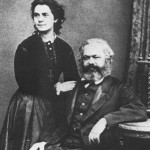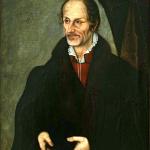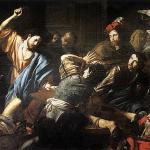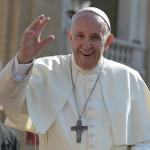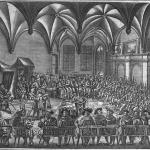 A religion is only plausible if it tells you what to do with your genitals.
A religion is only plausible if it tells you what to do with your genitals.
Thus, Humanae Vitae, Paul VI’s 1968 encyclical about artificial contraception, is where the Catholic Church forcefully asserted its legitimacy in the modern world.
The criticism, especially from American theologians, was swift and very critical. It was documented in books such as Dissent in and for the Church: Theologians and Humanae Vitae. The only recent papal document to be met with similar resistance is Laudato Si.
Benedict XVI is generally seen, depending on whom you ask, as someone who either rolled back or extended the reforms of Vatican II. Questions below the navel were obviously quite a large part of that story. This is why it’s surprising, as the NCR reports, that Benedict, then just Joseph Ratzinger, was an early opponent of the document:
In a new book published in Italy Friday, the retired pontiff says that while he agreed with the conclusions Paul drew in the encyclical Humanae Vitae he had trouble with the argumentation.
“In the situation I was then in, and in the context of theological thinking in which I stood, Humanae Vitae was a difficult text for me,” Benedict says in the book, to be published in the U.S. Nov. 3 by Bloomsbury under the title Last Testament: In His Own Words.
However, this does not mean he was opposed to the content of the encyclical, but its inadequate formulation in the language of natural law:
“It was certainly clear that what it said was essentially valid, but the reasoning, for us at that time, and for me too, was not satisfactory,” Benedict states.
“I was looking for a comprehensive anthropological viewpoint,” he continues. “In fact, it was [Pope] John Paul II who was to complement the natural-law viewpoint of the encyclical with a personalistic vision.”
In other words, the teaching needed to be much more clearly developed within a viable framework. This framework only came over a decade later with John Paul II’s revolutionary theology of the body, which French philosopher Fabrice Hadjadj says:
. . . inaugurated a new climate in the Church. Some say that his audiences are a theological bomb with a delayed fuse and for me they are a complete change of the Christian awareness of what the body and sexuality are.
Even if the framework came somewhat late, such a development is a tremendous gift worth waiting for.
The same goes for the revolutionary developments of Vatican II. Benedict does not feel regret for them. Instead he sees them as a great encounter with the worldwide Church that needed to happen:
Seewald then asks if Benedict has had “pangs of conscience” for his part arguing for church reform at the Council.
“Cardinal Frings later had intense pangs of conscience,” the retired pope replies. “But he always had an awareness, that what we actually said and put forward was right, and also had to happen.”
“We handled things correctly, even if we certainly did not correctly assess the political consequences and the actual repercussions,” he continues. “One thought too much of theological matters then, and did not reflect on how these things would come across.”
“In itself it was a moment in the Church, when you were simply waiting on something new, on a renewal, a renewal of the whole,” states Benedict. “This was not to be something coming only forth from Rome, but a new encounter with the worldwide Church. In that respect the time was simply nigh.”
Some things cannot be anticipated about the future. This is equally true of the Vatican II documents and those who doubt the Council’s efficacy in the present. The future still might hold more sources of renewal as John Paul II called them, because even in the present Vatican II should not, and cannot, be written off as a loss.
The blurb for Last Testament makes it look like it will spark a lot more debate about an ever-developing Church:
Pope Benedict made history by being the first Pope in over 700 years to resign from office. The Catholic Church the world over was stunned. Worn out by corruption in the Church and by an endless series of clerical sex scandals, he decided that the resolution of all these problems was outside his power for a man of his age.
Last Testament is nearest to an autobiography from the shy and private man who has remained “hidden to the world” in a former convent in the Vatican gardens. He breaks his silence on issues such as:
– The “Vatileaks” case in which his butler leaked some of his personal letters that alleged corruption and scandal in the Vatican
– The presence of a “gay lobby” within the Vatican and how he dismantled it
– His alleged Nazi upbringing
– His attempts at cleaning up the “dirt in the church” (clerical sexual abuse)
– The mysterious private secretary “Gorgeous George”On a more personal level he writes with great warmth of his successor Pope Francis, who he admits has a popular touch, a star quality which he has lacked. Much controversy still surrounds Pope Benedict`s Papacy–in this book he addresses these controversies and reveals how at his late age, governing and reforming the Papacy and particularly the Vatican, was beyond him.
You should also check out Benedict’s Unequivocal Endorsement Silences Francis’s Critics
Consider making a donation to this blog through the donation button on the upper right side of its homepage. Frankly, our family is a couple of months away from making a breakthrough away from living from check to check.
Stay in touch! Like Cosmos the in Lost on Facebook:

